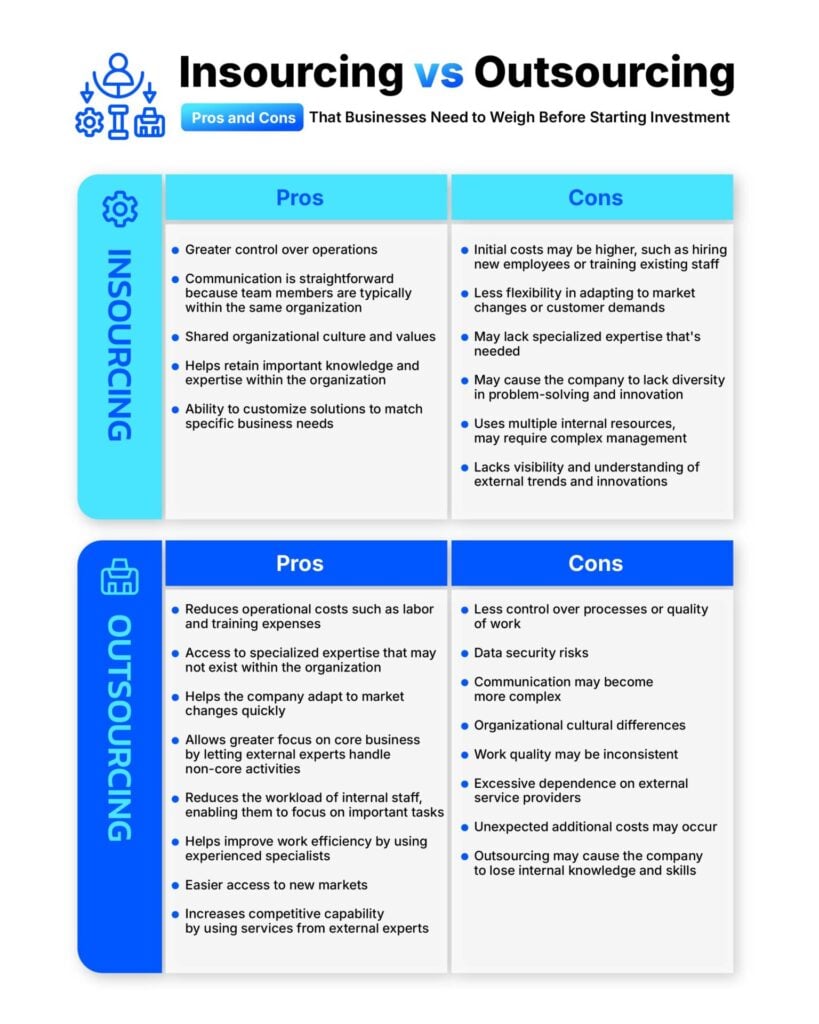In an era of rapid digital transformation, successfully delivering projects that create tangible results has become increasingly complex. Technological advances and an ever-challenging business environment have led organizations worldwide to face a critical question: Should project management be driven by internal teams (insourcing) or external expertise (outsourcing)?
Understanding Insourcing vs Outsourcing
Insourcing refers to utilizing internal employees to perform necessary operations – “building talent” with capabilities aligned to organizational needs.
Outsourcing involves contracting external parties or companies to perform work – “buying talent” with ready-to-deploy expertise.
Both options present distinct advantages and disadvantages, depending on each business’s specific requirements and characteristics.
Insourcing vs Outsourcing: Weighing the Pros and Cons

4 Key Considerations Before Making Your Decision
The decision between insourcing and outsourcing requires careful consideration of various factors:
1. Internal Expertise and Resource Allocation Planning
Does your organization have sufficiently capable teams? Is developing internal teams worth the investment?
2. Project Urgency and Time to Market
Does the project require rapid delivery? Will waiting to develop internal teams result in lost business opportunities?
3. Project Budget
Is there sufficient budget for long-term investment in internal team development?
4. Acceptable Risk Levels
Is your organization prepared to accept risks from external dependencies or risks from lacking internal expertise?
Many organizations choose a hybrid approach, outsourcing specialized work while keeping business-critical and culture-dependent tasks in-house.
Why Organizations Should Consider Outsourcing
When companies consider IT transformation, core system changes, or strategic projects, four key factors merit consideration:
- Strategic Investment Alignment – Ensuring investments align with corporate strategy
- Market Risk and Rapid User Requirement Changes – Managing uncertainty and evolving demands
- Technology Readiness and Emerging Solutions – Accessing cutting-edge innovations
- Time-to-Market – Meeting critical project timelines
PMO: The Strategic Engine for Major Project Success
Complex, high-stakes projects demand efficient project management. External Project Management Office (PMO) services often provide significant advantages over internal teams.
Strategic Advantages of External PMO
1. Cost Efficiency
By outsourcing, organizations can reduce expenses associated with hiring, training, and maintaining a full-time internal PMO team, allowing better resource allocation to other critical areas.
2. Access to World-Class Expertise
External PMOs provide access to specialized skills and expertise that may not exist internally, particularly valuable for complex IT transformation projects.
3. Focus on Core Business
Organizations can concentrate on core business activities while leaving project management to specialists.
4. Risk Mitigation
External PMO providers typically have established best practices and governance frameworks that can help reduce risks associated with IT transformation projects.
5. Objective Perspective
Organizations gain unbiased insights from external experts, enabling more effective decision-making.
4 Case Studies: Where PMO Makes the Difference
1. Large-Scale IT System Upgrade
A multinational corporation planning to upgrade IT systems across global offices leveraged external PMO expertise to manage large-scale, multi-country projects, ensuring timely and efficient implementation.
2. Cloud Migration Project
A financial services company decided to migrate data and applications to the cloud. Engaging an external PMO provided access to specialized cloud technology knowledge and project management expertise, reducing data loss risks and ensuring regulatory compliance.
3. New Software Development
A technology company requiring new software development—whether enterprise or mobile applications—utilized external PMO expertise to manage complex software development projects and ensure on-time product delivery.
4. Post-Merger System Integration
Following a merger, a company needed to integrate both organizations’ IT systems. An external PMO helped manage the integration process efficiently while minimizing risks associated with complex system consolidation.
Creating Balance for Sustainable Success
External PMO services enable companies to manage complex projects efficiently, allowing focus on core capabilities and business goal achievement.
The decision between “building talent” and “buying expertise” isn’t binary—it’s about creating the right balance for your organization’s context and strategy. Successful organizations:
- Develop internal core capabilities
- Intelligently leverage external expertise
- Build adaptive flexibility
- Focus on business outcomes
Begin Your Transformation Journey with an Experienced Partner
Smooth and ultimately successful project management cannot occur without appropriate teams and commitment. Strategic Project Management Office teams play crucial roles in overseeing entire project operations.
They must understand client expectations, define appropriate project management strategies and approaches, allocate the right people to the right tasks, establish clear responsibilities, apply expertise in planning and communication, manage project issues, and beyond that, effectively manage teams, build confidence, and foster teamwork throughout project execution.
For businesses seeking to develop PMO strategies to enhance competitive capabilities and drive organizational growth, Bluebik—as a leading digital transformation consultant offering comprehensive solutions—has expert Strategic PMO teams providing end-to-end solutions and advanced analytics, from strategy to customized organizational implementation.
For more information or consultation, please contact us at [email protected] or call 02-636-7011.












![Thumbnail [Post Event] HOW](https://bluebik.com/wp-content/uploads/2025/12/Thumbnail-Post-Event-HOW.png)